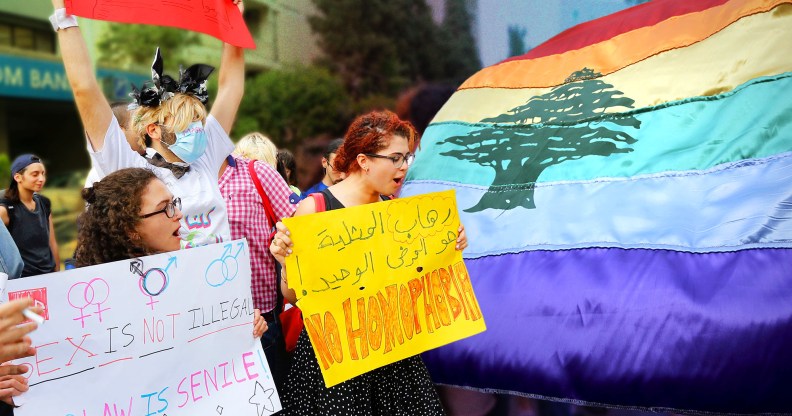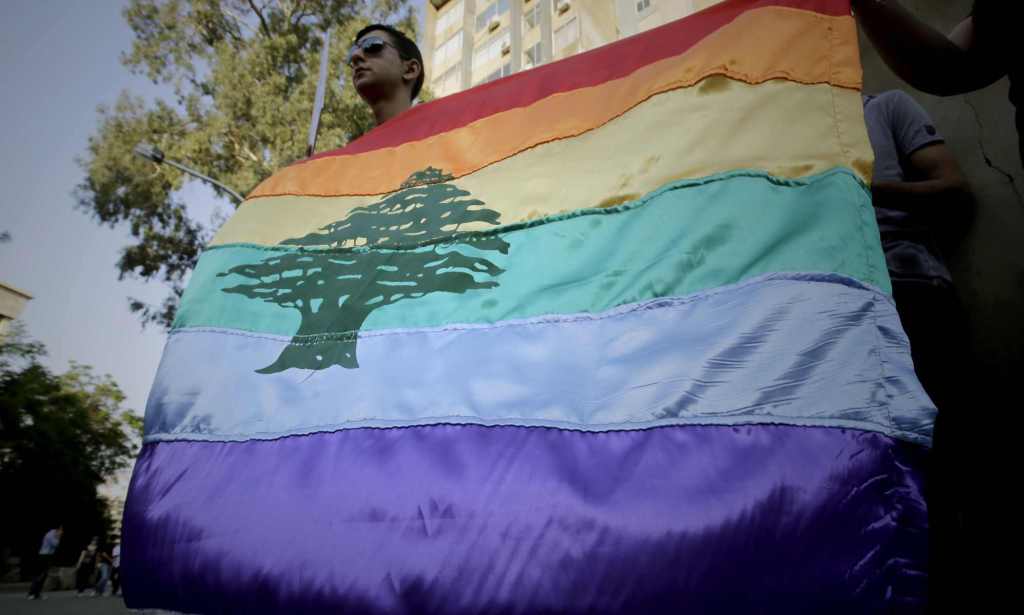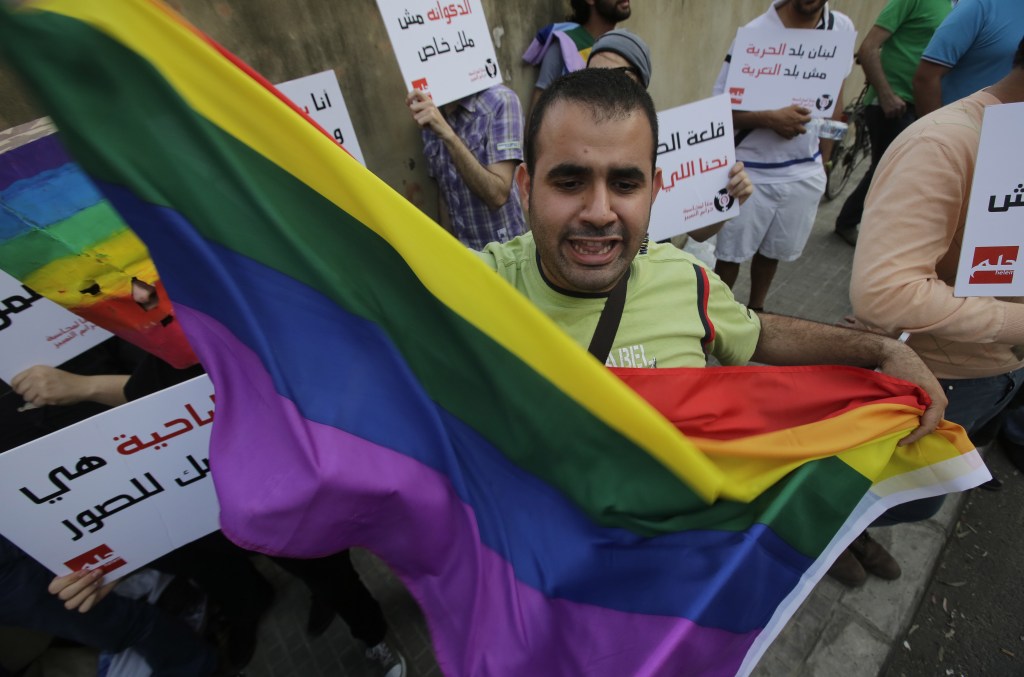Why the anti-LGBTQ+ crackdown in Lebanon is a threat to queer people everywhere

The same moral panic and culture wars around LGBTQ+ lives has gripped the Middle East, as it has the western world. (Credit: Getty Images)
LGBTQ+ people living in the western world may have seen news reports or social media posts about a violent crackdown on Lebanon’s queer community, in recent weeks and months.
It’s a long way from home, and perhaps it’s all too easy to think that what’s happening in the Middle East doesn’t affect people in the US, UK or across Europe.
That is not the case, though.
The same moral panic that has exploded across America, the United Kingdom and parts of Europe – resulting in anti-trans attacks in the media, restrictive legislation and the Far Right feeling emboldened enough to march on the streets – has gripped Lebanon and showcases what can happen when hate gives birth to horrific action in a tense political climate.
The situation in Lebanon is not just a local issue but one that speaks to wider anti-queer actions around the world, the director of Lebanon LGBTQ+ organisation Helem has warned PinkNews.
For a long time, Lebanon was considered a relatively safe space for LGBTQ+ people compared with other countries in the Middle East, some of which punish homosexuality with the death penalty.
While LGBTQ+ equality in the country was – and still is – well behind other nations, the community were able to be visible and gather in some capacity. People could meet in explicitly queer-friendly spaces and attend drag shows. Beirut Pride – the only such LGBTQ+ event in the Arab world – saw 4,000 people march for freedom and equality in 2017.
But the comparative freedom enjoyed by the community has been extinguished recently, as politicians, religious extremists and vigilante groups increase their hostility towards LGBTQ+ people, seeking to paint them as moral degenerates, and exclude them through censorship, threats of violence and legislative action.
The recent wave of violence, harassment and scrutiny has seen groups attempt to abolish what little freedoms people have. Such moves include Christian extremist group Jnoud El-Rab (Soldiers of God) carrying out an attack on a Beirut gay bar, homophobic speeches by the country’s leaders, arrests of community members, the banning of the board game Snakes & Ladders – for apparently having rainbow colours – and the censoring of the Barbie movie.
And when nine MPs signalled their intention to attempt to repeal Article 534 of the Lebanese Penal Code, which is often used to prosecute homosexuality under the guise of it being “relations against nature”, the response on social media was so intense – effectively an online harassment campaign – that one politician withdrew his signature altogether and three homophobic counter laws were put to parliament instead.
These laws seek to further criminalise homosexuality through the inclusion of a “deviancy” law.
‘Complex relationship’ between Lebanon and global issues
Helem did not support the decriminalisation law, not because the organisation does not support such a move, but because they understood the climate for queer people in the way the “brave” ally lawmakers – to whom they remain grateful – did not.
“We did not think that this was the right time, but it was done anyway,” Tarek Zeidan, Helem’s executive director, told PinkNews.
“We believe that it was premature and politically unsound and – unfortunately – we were vindicated by the massive backlash and the fact there was no actual plan in place to absorb the backlash.”
Helem wanted the law to be “much more robust [and] politically astute” to ensure it worked practically and did not have a negative impact on queer people in the long run.
“Not only did that create a lot of backlash, it became a very sensitive and successful inflection point for very conservative, very dangerous elements… to create this hysterical panic,” Zeidan added.
“There has been a paradigm shift in how LGBTQ issues are negotiated, understood and deployed in the public sphere. Not only just in the immediate region and Lebanon, but all over the world.”
“There is a very complex relationship between what’s going on globally and what’s happening locally.”

This worldwide culture war, and the impact it has, is most clearly illustrated in the United States, where over-inflated fears about the community – rooted in moralistic concerns over the nuclear family and children’s safety – have resulted in hundreds of anti-LGBTQ+ bills being legislated, Nazis openly protesting at drag shows and Pride events, and right-wing pundits making careers out of debating queer rights.
Similar developments have also been seen in the United Kingdom – with mass protests against Drag Queen Story Hour events and near-24/7 transphobic media coverage – and in Europe, where there are crackdowns on Pride in Turkey, lesbian mothers being stripped of their rights in Italy, and hateful narratives in Poland.
“[In] the United States, well into Europe, well into the global north and the global south, there has been a very intense and deliberate attempt to use the [LGBTQ+] issue, particularly ‘gender ideology’,” Zeidan noted.
“The social, cultural and political dynamics in one country has a huge effect on another.”
In Lebanon, there has been an “increasing attempt to scapegoat LGBTQ+ communities by manufacturing these moral public panics for significant political gain by conservative societal elements, to either distract from certain policies or decisions [and to] create a scapegoat for a lot of frustrations people are facing.”
This scapegoating comes amid a time of unprecedented political and economic strife for the nation.
The country is currently in the grip of a four-year-long economic meltdown which has hindered by the COVID-19 pandemic and the deadly explosion at the Port of Beirut in 2020. The economic turmoil has seen the local currency lose more than 90 per cent of its value and plunged millions of people into poverty.
At the same time, Lebanon has been in a political deadlock and without a president for nearly a year, following a dozen failed parliamentary sessions to elect a new head of state.
Conservatives have used queer people as the focal point to “rally and to mobilise societies, to push forward their agenda”.
For Zeidan, the anti-LGBTQ+ narratives and scapegoating have become an “incoherent bone of accusations” aimed at the community, due to the “chronic lack of information and awareness” which exists about queer people in the region.

The implications of these narratives have pushed LGBTQ+ rights back a decade, he says, and mean with “just a few hiccups here and there” there is a “very real danger that history will repeat itself and that the freedoms and liberty we have fought so hard for are reversed”.
LGBTQ+ people living in Lebanon have previously told PinkNews that they have been left feeling “hopeless”, and fear being threatened and beaten up “in clubs, on the streets, in our own homes”.
One of those, Amal (not her real name) said many of her friends now feel “scared and anxious” and “don’t want to fight any more”.
She went on to say: “That’s really sad because the only thing we can do right now is try to fight against what’s happening.”
A victim of the attack on the Beirut bar, Madame Om, who wished to remain anonymous, recalled feeling uncertain they would make it out of the situation alive. “Some were crying, some were hysterical, some were shocked and some said their last goodbyes,” they said.
“The air was so tense, we were all crammed up against the wall in the back room, anticipating like sitting ducks waiting to be exterminated, watching our friends getting physically beaten up by monsters.”
For Helem, the organisation went from a place where its 200 members could meet in queer spaces and host events, to not advertising events on social media, then to not having any get-togethers at all.
The community, in Zeidan’s words, is “practising self-censorship” and fear has almost wiped out their freedom of expression.
However, despite the fear and despair, the queer population is “incredibly strong and incredibly defiant”, according to Zeidan.
“The community really is our guiding light when it comes to what the priorities and expectations are,” he said. What we want people to know is that we’re all in this together, and to keep an eye on what’s happening across the world as these geopolitical shifts are taking place.”
How did this story make you feel?

